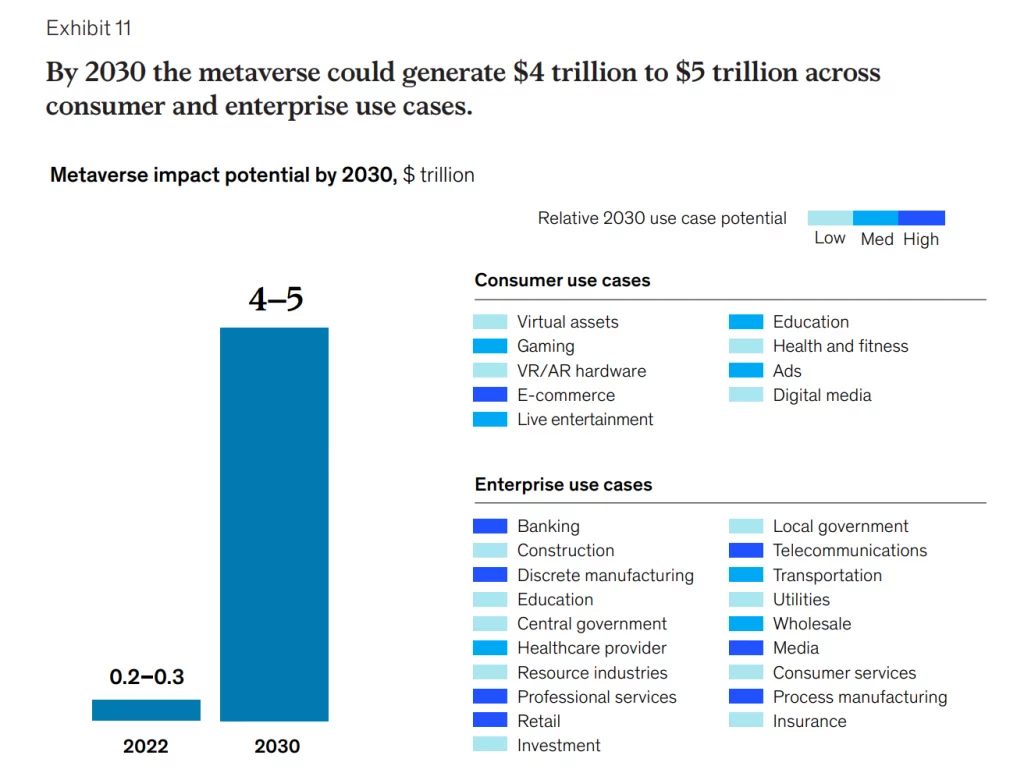Metaverse could generate $5 trillion by 2030, says McKinsey Report

The Metaverse, a virtual world created by the convergence of augmented reality and virtual reality, has the potential to generate up to $5 trillion in value by 2030, according to a report by McKinsey & Company.
What does the report say?
The report emphasizes the importance of four technology enablers for the Metaverse to reach its full potential: devices such as AR/VR headsets, sensors, haptic technology, and peripherals; interoperability and open standards; facilitating platforms and development tools; and a focus on maximizing the human experience in order to deliver positive experiences for consumers, end-users, and citizens. While the bear market of 2022 may have dampened excitement around the Metaverse and its sub-ecosystems such as non-fungible tokens (NFTs), the long-term potential for disruption remains strong.

Impact of Metaverse by 2030 | Source – McKinsey & Company
According to the survey conducted by McKinsey in April 2022, initiatives related to marketing, learning, and virtual meetings within the Metaverse have seen the highest levels of adoption across various industries. However, most other Metaverse initiatives have seen low to medium levels of adoption. The highly adopted initiatives are the more obvious use cases of the Metaverse at present but things can take new turns in the near future. This might lead to increased adoptions in various domains and possible creation of new ones.
As per the report by McKinsey, the Metaverse can have a major impact on both business and personal life. It is estimated that by 2030, more than half of all life events could take place in the Metaverse, which could generate up to $5 trillion in value. The report highlights the potential of the Metaverse to revolutionize the way we live and work.
As a concluding remark we’d like to highlight a crucial remark from the report which says that, “The Metaverse is simply too big to be ignored.”
Some Future Prospects
It is an arguable topic as of now but the vast potential is least tapped at the moment. Earlier in 2021, the biggest social media company, Facebook rebranded itself as ‘Meta,’ signifying their vision and their tacit agreement on Metaverse’s potential future.
Even the travel industry finds a relevant use case of the Metaverse. According to a survey conducted by Booking.com, which included 24,179 respondents across 32 countries, there is a strong interest in using virtual reality to explore travel destinations and plan itineraries. The survey found that Gen Z and Millennials were the most likely to try out virtual travel experiences, with 45% and 43% of respondents respectively expressing interest.
Nearly half of the respondents, or 43%, said they would use virtual reality to inspire their travel choices, and 4,574 participants said they would only consider traveling to a new place after experiencing it virtually. Over 35% of respondents said they would be willing to spend multiple days in the metaverse to get a feel for different destinations. Booking.com noted that technologies such as haptic feedback could enhance the virtual travel experience by allowing users to feel sandy beaches and tropical sun without leaving home.
Apart from travel, modern day romantics may well find the idea of dating in Metaverse to be highly ingenuous. It would increase their horizons to make connections that could span different cities or countries. The possibilities are endless.
Discuss this news on our Telegram Community. Subscribe to us on Google news and do follow us on Twitter @Blockmanity
Did you like the news you just read? Please leave a feedback to help us serve you better
Disclaimer: Blockmanity is a news portal and does not provide any financial advice. Blockmanity's role is to inform the cryptocurrency and blockchain community about what's going on in this space. Please do your own due diligence before making any investment. Blockmanity won't be responsible for any loss of funds.














